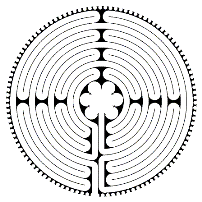1. Consciousness and Its Objects:
Mis-taking "that by which" we are conscious of our ideas, perceptions, memories, imaginations, conceptions or other objects of thought, for "that which" we apprehend during consciousness.
At the extremes, the former objects allow us to communicate at the highest levels of human experience; mis-taking the latter for the former leads to solipsism, the assertion that everthing of which I am aware or conscious is a figment of my own mind.
All of us can partcipate in the former approach. It is commonsensical. There is only one solipsist, right? The true solipsist will say it's you and me, we are one, but actually mean only him or herself is real.
2.The Intellect and the Senses:
Mis-taking the brain's ability to experience sensations for the mind's ability to intellectualize during cognition.
At the extremes, the former limits are mental functions to our brain's activities or lack thereof, and denies the existence of anything that is non-sensible; the latter leads to artificial intelligence (the re-invention of angels). The former leads to a radical forms of materialism (nominalism, subjectivism, solipsism, complete skepticism, and cynicism); the latter to radical forms of idealism (archetypal universalism, conceptualism). We are human beings. Our brains are necessary for cognition and intellectualization, but they are not sufficient in and of themselves to act in those ways.
3. Words and Meaning:
Mis-taking the use of verbal description for significant communication of ideas.
"...our ideas do not have meaning, they do not acquire meaning, they do change, gain or 'lose' meaning. Each of our ideas is a mean and that is all it is. Mind is the realm in which menaings exist and through which everything else that has meaning acquires meaning, changes meaning, or loses meaning." "A meaningful word, a notation with significance, is a sign. Signs that are only and always signals are used by animals. Humans use signs that are signals and also signs that are form designators to refer to other mental concepts. Communication reduced to verbal descriptions using strings of code words amount to signals on an animal level. Communication of only strings of ideas amounts to an attempt at artificial intelligence. Commonsense communication works between the extremes. Naming is not merely asserting the existence of something or someone and giving it or him or her a description, but rather naming is an acknowledgment of a being that exists beyond the domain of my mind.
4. Knowledge and Opinion:
Mis-taking two different approaches for knowledge and restricting others to mere opinion: the approach of skepticism and logically positive sciences or the approach of phenomenalism and transcendental philosophy for knowledge.
At the extremes, skepticism masquerades as knowledge because it claims only empirical evidence to be real, but must resort to doubting doubt itself to provide a "private" proof of a possible starting point.
Likewise, logically positive sciences masquerade as knowledge by asserting axiomatically starting points from which to launch hypothetical proofs.
Rather than reach knowledge from this approach, we reach self-rightgeous indulgence of self.
On the other extreme, the raw data of phenomena is offerred as what is really known and all other views are pushed into mere opinion, thus rendering the intellectual enterprise an ultimately futile exercise of attempting to communicate beyond phenomenal worlds which may or may not be shared.
Likewise, transcendental concepts of the mind are invented and offerred to secure what is really known and all other views are pushed into mere opinion, thus again rendering the intellectual enterprise an ultimately futile exercise of attempting to communicate beyond transcendental concepts of the worlds which may or may not be shared. Rather than reach knowledge from this approach, we reach self-rightgeousness domination of others.
Based in large part on the mistakes noted in 1,2, and 3, these approaches fail to deliver what commonsense readily acknowledges. Few things are certain. Logic, mathematics, and definitions provide certain starting points for communication.
Most things have sufficient evidence to support our knowlege of them; but they move from opinion to knowledge based on accumulated viewpoints and observations and no relevant or pertinent contradictions. Science and commonsense experiences themselves exemplify this kind of knowledge. And finally, the knowledge that is not so supported is referred to as opinion.
5.Moral Values:
Mis-taking "right" moral values supported by opinions, built with might, for moral values with "might" supported by right, built with knowledge of what is good for human beings.
At the extremes, prescriptive judgments about what is "right" that comes
ultimately from power lead to subjective self-righteousness or moral relativism and resulting forms of hedonism or utilitarianism. Commonsense helps us understand that we address our natural needs before our acquired desires as a practical matter. At the same time commonsense teaches us to realize that the love of something or someone regularly commands our wills to take a course of action that satisfies our deeped hidden desires, and thus more than what we assess as needed.
6.Happiness and Contentment:
Mis-taking the psychological state of contentment for the ethical or spiritual state of happiness found in the quality of a morally good life.
At the extremes, both utilitarianism and the discharge of one's dutiful obligations masquerade as happiness.
Commonsense shows us that doing either what is useful or what is one's duty does not always assure happiness, though we may rest contented having acheived them.
7.Freedom of choice:
Mis-taking immature determinism or what chance means for indeterminism for what is meant by freedom of choice.
At the extremes, determinism allows rational choice, fails to recognize non-rational behavior, and thus leaves out the powers of our human wills, perhaps confusing them with our emotions. Indeterminism allows emotional choices by ultimately denying rational behavior, fails to recognize irrational behavior, and thus leaves out the powers of our human wills, perhaps confusing them with our reasons.
Commonsense tells us that freedom of choice is one of the defining characteristics of human beings and that because of it, we have the choice to reject determinism and indeterminism and accept judgment making and decision-making as practical alternatives to the certainty and uncertainty that determinism and indeterminism promote.
8.Human Nature:
Mis-taking humankind's animal-like physical behaviors or spirit-like mental behaviors for its human nature.
At the extremes, we human beings are mistaken for a different breed with determined bodily limits or we are mistaken for a different manifestation of one or many spirits.
Commonsense tells us we are neither animals nor angels, and surely not God (though, as creatures, we are God's children). We are a separate kind of being named human, with bodily limits, but with unlimited spiritual potential after our creation.
Our minds, hearts, souls, and spirits are incarnated in our bodies, from conception most would say today. When we die, we are excarnated. We disappear. Those of us who belief in the after-life understand either a continuing set of many re-incarnations or a single recall into a new creation at the word of God. When that recall is assented to, God's word is so effective we are said to resurrect.
9. Human Society:
Mis-taking conventional theory of social contract for the origin of government as a human institution that meets the needs and wants of the naturally gregarious nature of human beings in society.
At the extremes, those on the "left" seek to treat individuals equally in all possible respects despite the differences among us by all conventional means. Those on the "right" seek to protect individuals unequal in some respects from the brutal people among us by all conventional means.
Because such approaches require conventional agreements, when they cannot be reached, people become frustrated to the point of overthrowing their governments. Yet, regardless of the government in power, commonsense tells us that human society continues throughout the duration of the conflict, not by centrist compromise but because of our naturally desire to live in society rather than as hermits.
10. Human Existence:
Mis-taking physical appearances or behaviors, or consciousness in human beings, for the only reality we identify with in existing things or persons.
At the extremes, on the one hand there are those who claim that material things are all that is real and that there is no non-material reality. Humans are no more and no less than material bodies having a limited capacity to transform energy over time. When they reach their limits, the human being dies and their body disintegrates. That's all.
On the other hand, there are those who claim that spiritual things are all that is real and that there is only non-material reality we call consciousness. Humans are no more and no less than spirits connected to illusory bodies with a unlimited capacity to transform energy over time. When they die their body disintegrates, but not their spirit. It returns and reincarnates until it no longer needs to. That's all.
Commonsense tells us human beings have bodies not the other way around. Commonsense tell us that our appearances and our behaviors do not tell everything about us or about any other observable thing. There's much more to the mystery of each individual. Commonsense tells us as well that we are conscious not only of ourselves but the reality of other subjects and other objects as well.
9. Human Society:
Mis-taking conventional theory of social contract for the origin of government as a human institution that meets the needs and wants of the naturally gregarious nature of human beings in society.
At the extremes, those on the "left" seek to treat individuals equally in all possible respects despite the differences among us by all conventional means. Those on the "right" seek to protect individuals unequal in some respects from the brutal people among us by all conventional means.
Because such approaches require conventional agreements, when they cannot be reached, people become frustrated to the point of overthrowing their governments. Yet, regardless of the government in power, commonsense tells us that human society continues throughout the duration of the conflict, not by centrist compromise but because of our naturally desire to live in society rather than as hermits.
10. Human Existence:
Mis-taking physical appearances or behaviors, or consciousness in human beings, for the only reality we identify with in existing things or persons.
At the extremes, on the one hand there are those who claim that material things are all that is real and that there is no non-material reality. Humans are no more and no less than material bodies having a limited capacity to transform energy over time. When they reach their limits, the human being dies and their body disintegrates. That's all.
On the other hand, there are those who claim that spiritual things are all that is real and that there is only non-material reality we call consciousness. Humans are no more and no less than spirits connected to illusory bodies with a unlimited capacity to transform energy over time. When they die their body disintegrates, but not their spirit. It returns and reincarnates until it no longer needs to. That's all.
Commonsense tells us human beings have bodies not the other way around. Commonsense tell us that our appearances and our behaviors do not tell everything about us or about any other observable thing. There's much more to the mystery of each individual. Commonsense tells us as well that we are conscious not only of ourselves but the reality of other subjects and other objects as well.


















































